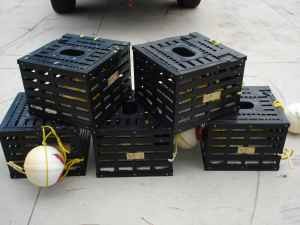 State fishery managers have removed a loophole that gave some unscrupulous commercial trap fishermen a leg up on fellow fishermen and had serious impact on the lucrative spiny lobster fishery, which is centered in the Florida Keys.
State fishery managers have removed a loophole that gave some unscrupulous commercial trap fishermen a leg up on fellow fishermen and had serious impact on the lucrative spiny lobster fishery, which is centered in the Florida Keys.
The Florida Fish and Wildlife Conservation Commission (FWC) amended its regulations for stone crab traps used in Collier, Monroe and Miami-Dade counties. The FWC board approved the new rules this week.
Beginning this year’s stone crab season, Oct. 5, the use of round entrances — also known as throats or funnels — will no longer be allowed for stone crab traps used in state or federal waters off these three counties. The changes will also require that the rectangular or rounded rectangular entrances typically used in stone crab traps be no larger than 5½ by 3 1/8 inches at the most narrow portion of the opening.
The changes will bring the gear regulations for these three counties more closely in line with the way the stone crab fishery has traditionally operated in the region and prevent the use of stone crab traps to target lobster, state fishery managers said. The FWC did not adopt any changes to the allowable size of the overall trap, although that had been considered previously.
Representatives of both the stone crab and lobster industries have voiced concerns about the practice, and the industry has requested changes to the rules describing the stone crab trap specifications for South Florida in order to prevent the use of altered stone crab traps in the region, according to FWC.
Bycatch of lobster in stone crab traps has always occurred, and vice versa. But recent changes to both fisheries have created additional motivation for fishermen to shift their effort from targeting stone crab to lobster, the FWC biologists said.
“There are over 600,000 stone crab traps licensed in Collier, Monroe and Miami-Dade counties, many of which could potentially be directed toward lobster if the practice is allowed to continue,” the biologists wrote in their report. “The (FWC) commission has been working in recent years to make sure the spiny lobster fishery is managed fairly and to ensure that participants in all components of the commercial fishery (trap, dive, and bully net) have appropriate access to lobster resources. However, recent changes in the way the stone crab fishery operates could be giving stone crab fishermen an unfair advantage in the lobster fishery.”
At $70 million a year, spiny lobster is the most lucrative commercial fishery in the Florida Keys.
Spiny lobster prices have increased substantially in recent years, primarily because of the high demand created by a market for live lobsters in Asia. Prices exceeded $15 a pound at the height of this season. In addition, the recent declines in the stone crab fishery catch have resulted in stone crab fishers seeking other avenues to supplement their income, according to the FWC.
The fair market value of trap certificates is dramatically different for the two fisheries, because the high demand for spiny lobster, the limited number of available lobster trap certificates and the depressed stone crab fishery.
Stone crab trap certificates are reportedly selling for around $10 each, while lobster trap certificates are reportedly selling for over $150 each, according to the FWC.
The issue is further complicated by the fact that both fisheries operate under trap reduction programs that limit the total number of traps that can be used across each.
These programs were implemented jointly by the FWC and the state Legislature and are designed to decrease the number of traps in the water over time, increase catch per trap and decrease user conflicts, FWC biologists said.
“They will now be fishing with those traps more for stone crab than lobster,” said Conch Key-based trap fishermen, who has pushed for the new rules. “This will help even the playing field. They were really fishing more for lobster than stone crabs.”
For information on marine fisheries and stone crabs, fishermen should go to the FWC’s web page at MyFWC.com/Fishing and select “Saltwater Fishing.”
Source: FWC tightens rules on use of certain stone crab traps | KeysNews.com
